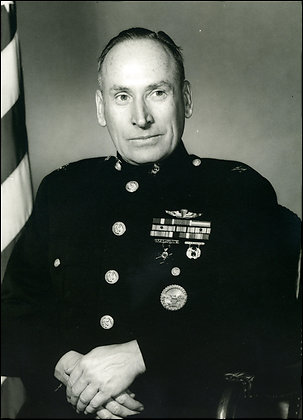Daniel C. Pollock, 93, a Marine Corps Colonel who was highly decorated for his combat service on Iwo Jima during World War II and later became a public administration and human resources expert, died December 23, 2007, at his home in McLean, Virginia. He had sepsis.

Colonel Pollack received the Navy Cross, the service’s highest award for bravery other than the Medal of Honor, for his work as a battalion commander with the 5th Marine Division on Iwo Jima in March 1945.
The citation said that more than half of Colonel Pollack’s battalion had been killed or wounded by the fifth day of intense combat against the Japanese. But he continued moving toward the front lines and conducted personal reconnaissance of an area behind Hill 165, “the last high ground on the island controlled by the Japanese,” according to the citation.
“A brilliant and fearless leader, he directed the capture and occupation of the hill with only a minimum of personnel losses and led a small reconnaissance patrol into hazardous, unexplored beach areas, locating routes of approach to the final ravine positions of the Japanese,” the citation said. His work led to the “the elimination of a vital strong point” of the enemy, it said.
His other decorations for his service on Iwo Jima included the Purple Heart. He later was among the first Americans to lead U.S. forces into Japan at the end of the war.
His final active-duty assignment, in 1964, was on the Far East desk of the Joint Chiefs of Staff’s plans and policy directorate.
After retiring from the military, he was Asia-Pacific branch chief at American University’s Cultural Information and Analysis Center, a research scientist at the American Institutes for Research and a Defense Department consultant.
Daniel Carroll Pollock was a native Washingtonian and 1931 valedictorian of the old Central High School, where he was also colonel of the Cadet Corps.
He attended the U.S. Military Academy at West Point, N.Y., and George Washington University before enlisting in the Marines in 1936.
In retirement, he became extensively involved in community activities and won awards for his volunteerism from the Town of Herndon and the American Red Cross, for which he taught 1,000 hours of CPR.
He was a president of the Potomac Hills Citizens Association in McLean, a chairman of the Fairfax County solid waste committee, a director of Herndon Radio Emergency Action Teams, a founding member of the Herndon Police Citizens’ Support Team and an election precinct captain in McLean.
He also helped plan the Marine Corps’s remembrances for the 45th and 50th anniversaries of the Iwo Jima invasion and was the 5th Marine Division’s representative to the National Marine Corps Council.
His wife of 50 years, Elinore Hayward Pollock, died in 1993.
Survivors include four daughters, Teri DeLaFleur and Lin Pollock, both of Alexandria, Jane Christiansen of Syracuse, New York, and Carol Morris of Chatham, New York; 10 grandchildren; 10 great-grandchildren; and three great-great-grandchildren.
POLLOCK, DANIEL C.
Citation:
The President of the United States takes pleasure in presenting the Navy Cross to Daniel C. Pollock (0-5818), Lieutenant Colonel, U.S. Marine Corps, for extraordinary heroism as Commanding Officer of the First Battalion, Twenty-Sixth Marines, FIFTH Marine Division, Volcano Islands, 19 March 1945.
With his battalion reduced to forty-three percent of its landing strength and the remaining members in a critical state of fatigue during the fifth consecutive day of combat against strong enemy defenses concealed by camouflage in extremely rough terrain, Lieutenant Colonel Pollock moved forward into the front lines under intense fire and, conducting a thorough personal reconnaissance of this dangerous area, prepared a bold enveloping maneuver aimed toward positions behind Hill 165, the last high ground on the island controlled by the Japanese.
Increasing the morale and fighting efficiency of the battalion by words of encouragement as he proceeded from man to man, Lieutenant Colonel Pollock inspired a new confidence in his exhausted men and led a daring attack through the enemy to the rear of the hill, disorganizing the defending force and annihilating hostile troops who attempted withdrawal.
A brilliant and fearless leader, he directed the capture and occupation of the hill with only a minimum personnel losses and led a small reconnaissance patrol into hazardous, unexplored beach areas, locating routes of approach to the final ravine positions of the Japanese.
His superb tactics, fearless aggressiveness, indomitable spirit and unswerving devotion to duty in the face of grave danger were decisive factors in the elimination of a vital strong point, and his heroic conduct throughout reflects the highest credit upon Lieutenant Colonel Pollock and the United States Naval Service.
Commanding Officer, Fleet Marine Force, Pacific: Serial 44532 (April 1, 1946)
Colonel Pollock was laid to rest with full military honors in Arlington National Cemetery on 27 February 2008.
Michael Robert Patterson was born in Arlington and is the son of a former officer of the US Army. So it was no wonder that sooner or later his interests drew him to American history and especially to American military history. Many of his articles can be found on renowned portals like the New York Times, Washingtonpost or Wikipedia.
Reviewed by: Michael Howard
